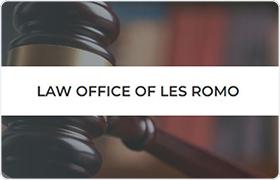Leander Real Estate Lawyer, Texas
Sponsored Law Firm
-
 x
x

Click For More Info:
-
Law Office of Les Romo
102 West Morrow Street Suite 202 Georgetown, TX 78627» view mapEstate Law Helping You Understand Your Options
Attorney Les Romo can help protect your interests and resolve your legal issue in the best possible way. Attorney Romo is dedicated to vigorously representing his clients.
800-769-7481
Terry L. Belt
✓ VERIFIEDTerry Belt arrived in Austin in 1965 from the little German town of Weimar, Texas, where he learned to haul hay bales for the local farmers. He attend... (more)
Les David Romo
✓ VERIFIEDAttorney Les Romo graduated from Southwestern University here in Georgetown and went on to earn his Doctorate of Jurisprudence at St. Mary’s Univers... (more)
Frank E. Scofield
✓ VERIFIEDA fourth-generation Texan, Frank E. Scofield was born to ranch work and the outdoors. Prior to completing undergraduate studies at UT Austin, he worke... (more)
William T. Peckham
✓ VERIFIED
James W. Goldsmith
FREE CONSULTATION
CONTACT Les Romo Georgetown, TX
Les Romo Georgetown, TX Practice AreasExpertise
Practice AreasExpertise




